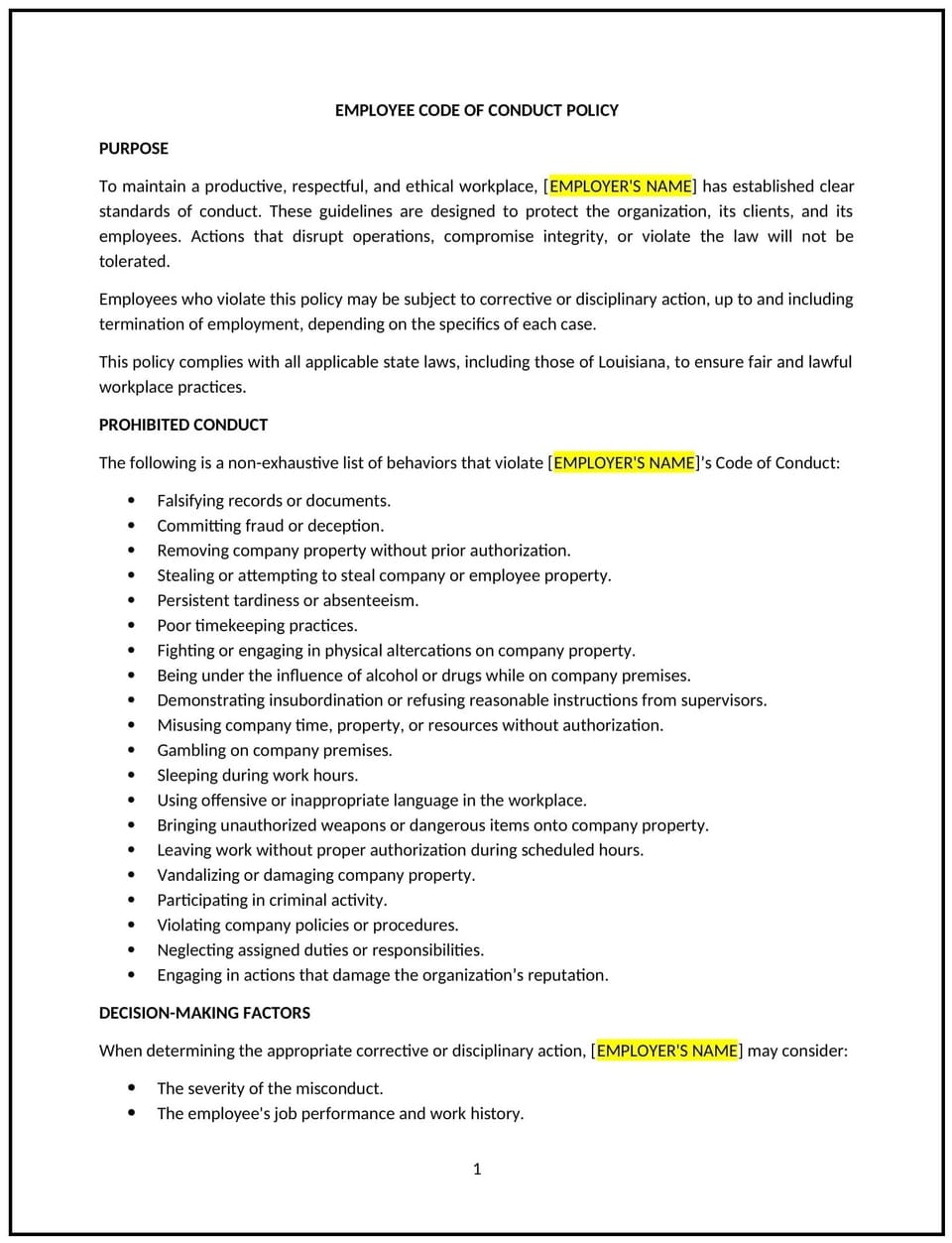Standards of conduct policy (Louisiana): Free template

Standards of conduct policy (Louisiana)
This standards of conduct policy is designed to help Louisiana businesses establish clear expectations for workplace behavior and professionalism. It outlines acceptable practices, responsibilities, and consequences for misconduct to maintain a respectful and productive work environment.
By implementing this policy, businesses can promote accountability, foster a positive culture, and minimize workplace conflicts.
How to use this standards of conduct policy (Louisiana)
- Define expectations: Clearly describe behaviors and practices expected of employees, such as punctuality, professionalism, and collaboration.
- Outline prohibited conduct: Provide examples of misconduct, including harassment, theft, insubordination, or inappropriate language.
- Include reporting procedures: Detail how employees can report violations or concerns confidentially.
- Communicate responsibilities: Emphasize the roles of employees, managers, and HR in upholding and enforcing standards.
- Address disciplinary actions: Specify the range of consequences for violations, such as verbal warnings, suspension, or termination.
- Provide training guidelines: Include requirements for employee and manager training on workplace conduct.
Benefits of using a standards of conduct policy (Louisiana)
Implementing this policy provides several advantages for Louisiana businesses:
- Promotes professionalism: Encourages respectful and responsible workplace behavior.
- Reduces conflicts: Establishes clear expectations to minimize misunderstandings and disputes.
- Enhances accountability: Holds employees and management responsible for maintaining a positive work environment.
- Protects workplace culture: Reinforces the business’s values and commitment to inclusivity and respect.
- Reflects Louisiana-specific practices: Adapts to local workplace norms and cultural considerations.
Tips for using this standards of conduct policy (Louisiana)
- Train managers: Provide training on how to address violations consistently and fairly.
- Communicate clearly: Share the policy during onboarding and provide reminders during team meetings or updates.
- Document incidents: Maintain detailed records of reported violations, investigations, and actions taken.
- Encourage feedback: Create opportunities for employees to provide input on workplace conduct and policy effectiveness.
- Update regularly: Revise the policy to address changes in workplace practices or Louisiana-specific considerations.
Q: What behaviors are expected under this policy?
A: Employees are expected to demonstrate professionalism, punctuality, teamwork, and respect for coworkers and company policies.
Q: What types of conduct are prohibited?
A: Prohibited conduct includes harassment, discrimination, theft, insubordination, use of inappropriate language, or any behavior that disrupts the workplace.
Q: How can employees report violations of the standards of conduct?
A: Employees can report violations confidentially to HR, their manager, or through designated reporting channels outlined in the policy.
Q: What disciplinary actions may result from violations?
A: Disciplinary actions may range from verbal warnings and written notices to suspension or termination, depending on the severity of the violation.
Q: Are managers held to the same standards as employees?
A: Yes, managers are expected to model the standards of conduct and enforce them consistently within their teams.
Q: How often should this policy be reviewed?
A: The policy should be reviewed annually or when significant changes occur in workplace practices or Louisiana-specific considerations.
Q: What resources are available for employees to understand the policy?
A: Employees can access the policy document, attend training sessions, or consult HR for clarification or additional guidance.
This article contains general legal information and does not contain legal advice. Cobrief is not a law firm or a substitute for an attorney or law firm. The law is complex and changes often. For legal advice, please ask a lawyer.


